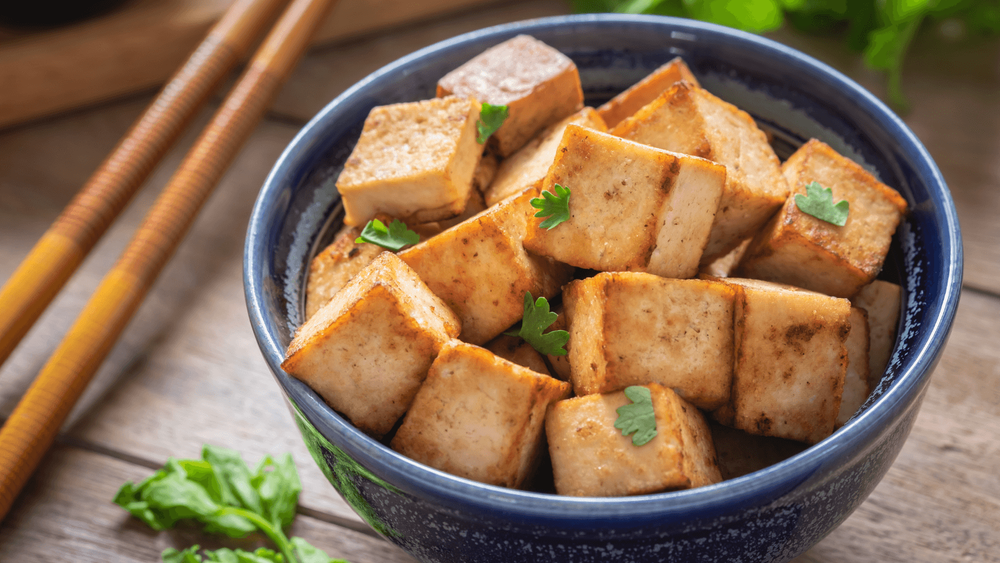Benefits of tofu
Firstly, what is tofu? Well, if you've ever taken a good look at your local Chinese menu - you’ll see it. It’s often under the vegetarian section as ‘bean curd’, and that's exactly what it is. Tofu is bean curd and bean curd is processed soybeans.
The process is simple: dried, raw soybeans are soaked overnight and then blended with water once soft - now you have soy milk. The soy milk should be brought to a boil with a few drops of lemon to start the curdling process - hence the name ‘bean curd.’ The milk will curdle and so curds should start to form. The curds are then pressed into tofu - it’s that simple. The longer you press tofu, the firmer it will be, it's all down to preference.
Tofu originated from ancient China around 2000 years ago and is thought to have been discovered by a man named Liu An. Tofu is now widely popular in both Eastern and Western countries and can be eaten as a savoury and sweet dish.
If you want to avoid the added oils used in the process of cooking, you can also eat tofu raw. Summer rolls, spicy cold tofu and Asian salads are a few simple ways to eat raw tofu, especially when it is still fresh and firm. Of course, the ever-popular crispy tofu is always a great option, but it's not always best when you're short on time.
Now that the basics are down - let’s talk about the several health benefits of tofu. People always seem to wonder, is tofu good for you? The answer is simply yes! Tofu is rich in fibre and it’s a great source of complete protein. A complete source of protein has all nine essential amino acids, aka a balanced amino profile. Tofu is also a ‘minimally processed food’ which, according to NOVA classifications, is when “salt, sugar, oils, fats, or other substances are not added to the original food.”
It is also good to know that tofu has a high content of isoflavones, a glycoside with an oestrogen-like structure that is derived from plants. Okay, but what does that mean? Well, according to PubMed, soy isoflavones are scientifically proven to reduce total cholesterol and even the risk of cardiovascular disease such as stroke and heart disease. The article goes on to explain that “this is because soy isoflavone intake showed a significant association with systolic blood pressure”, which basically means that soy isoflavone is great for reducing blood pressure.
Another study was undertaken to see if isoflavones had any effects on a sample group of 30 post-menopausal women’s skin over a period of 6 months. For example, if any of the women’s skin would improve by looking at indicators such as skin elasticity, collagen production and thinning. The results showed that for 23 women there was an almost 10% increase in the outer layer of skin called the epidermis. The collagen production of 25 women increased in their dermis which is the inner layer of the second layer of skin. The skin's overall elasticity was improved in 22 women.
Aside from the fantastic health benefits of tofu, the low impact it has on the environment is also a great reason why you should eat tofu. It takes around 2,520 litres of water to produce 1kg of tofu whilst 15,415 litres are used for 1kg of beef and 4,325 litres for 1kg of chicken. That’s more than 6 times the amount of water that is wasted for the same amount of tofu as beef. Most of this water is used for livestock to drink whilst the water used in the production of tofu is to water the plant directly.
Unfortunately, soybeans have a relatively high impact on the environment due to their use in feeding livestock. Soybean crops are mass-produced and are a cause of deforestation because of how much land is needed to grow the plant. When arable land is overfarmed the soil loses its nutrients and becomes infertile, especially when fertilisers are used. This is called soil degradation. Large amounts of vital resources such as water and energy are also needed.
However, tofu is not why most soybeans are grown and the finger should really be pointed at meat and dairy production. According to WWF, “almost 80% of the world’s soybean crop is fed to livestock, especially for beef, chicken, egg and dairy production”, so tofu really isn't to blame for why soybeans have fast become mass-produced. Soybean oil is also a popular byproduct of the beloved plant and is the second most consumed vegetable oil.
As you’ll have probably guessed by now - there are many incredible health benefits of tofu and it's easy to see why so many people around the world already enjoy the ancient food. If you want to try something new, maybe pick up some tofu at your local shop and give it a go, or, if you’re already a fan, maybe give a new recipe a try.
If you're just in the mood to cook why not check out our carbonara recipe, have a look at our incredible vegan chilli con carne recipe if you fancy some heat!
